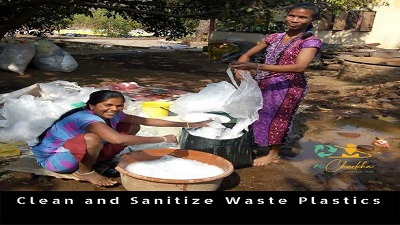Category : Environment Conservation | Location : Maharashtra | Posted on 2021-08-03 00:34:33

Plastic Free July may have come to an end, but eco-warriors are fighting an ongoing war on plastic. Pune-based Amita Deshpande is one of those warriors and has been waging a war against plastic discards and single-use plastics since her student days.
Distressed by heaps of discarded wrappers and plastic covers, Amita, a software engineer, was determined to find an innovative solution to upcycle the hills of plastic trash. From experience she knew it had to go beyond glamping or collecting the trash to make a lasting difference to the environment.
“It is important to ensure that the collected and segregated plastic waste is not dumped somewhere else. It is important to recycle in such a way that it does not again pollute some other space.”
During her stint in the US, where she went for her higher education at Purdue University, Amita focussed on studies in sustainability. She worked with CSR teams of leading multinational corporations and community-based organisations in the United States and India. After she returned to India in 2013, she founded an upcycling project under Aarohana EcoSocial Developments in 2015. When the pandemic broke out in 2020, she restructured her organisation as reCharkha – The EcoSocial Tribe.
“I worked as a consultant for CSR activities of several corporates. But I wanted to do something more than working as a consultant. It had to be a hands-on; it was not enough to talk about plastic waste and problems created by it. In cities, there was some kind of collection and segregation of plastic waste that was almost wholly missing in rural areas. In the course of my work as a consultant, I discovered high levels of rural unemployment. My aim was to come up with a pragmatic solution that was sustainable, innovative and created livelihoods for rural people while tackling the problem of plastic waste.”
Amita points out that in those days, there were only a few organisations upcycling plastic. Moreover, thin wrappers and single-use plastic covers were not of value even to rag-pickers and so were left behind,
Eventually, she came across a process of spinning plastic yarn from the discarded plastic and weaving it into fibre. “It was not capital intensive nor did it create pollution. I informally attended classes for a couple of days to learn spinning on a charkha (spinning wheel) and weaving from a school for the visually disabled.”
After collecting or buying the plastic covers and wrappers from rag-pickers, the plastic is manually cut into long strips with a pair of scissors. It is then spun on a conventional charkha into plastic yarn and then woven into fibre that is used to make many kinds of bags, pouches, yoga mats, pen holders, plant holders, tablet covers and more.
“We began in a small way from a tribal village in Dadra Nagar Haveli. After recruiting a trainer, we trained some of the women there in spinning the charkha and weaving the plastic yarn into fibre. Six years later, many housing societies and apartments in Pune bring the segregated plastics that are washed and dried to our collection centre at Kothrud in Pune. It is washed, sanitised and dried again before we cut the plastics into thin strips,” says Amita.
Even the teak looms on which the fabric is woven were recycled — bought from a sari weaving unit that closed down when they could no longer compete with the power loom.
At present, reCharkha with a staff of 25, has an outlet in Pune and an online presence. A designer has recently joined them to reimagine the products and find
“Many organisations are now doing plastic weaving but it is not spun to this scale. However, people must realise that they must reduce the use of plastic. That is the only way forward. Our work has introduced many to the idea of reducing their use of plastic. That is a motivation for us to keep going.”new ways to use plastic fibre. Amita says thanks to their work, their supporters and well-wishers all over the country send cleaned and dried plastic discards.
Source: https://www.thehindu.com/sci-tech/energy-and-environment/amita-deshpande-recharkha-ecosocial-tribe-upcycle-plastic-sustainability/article35675892.ece